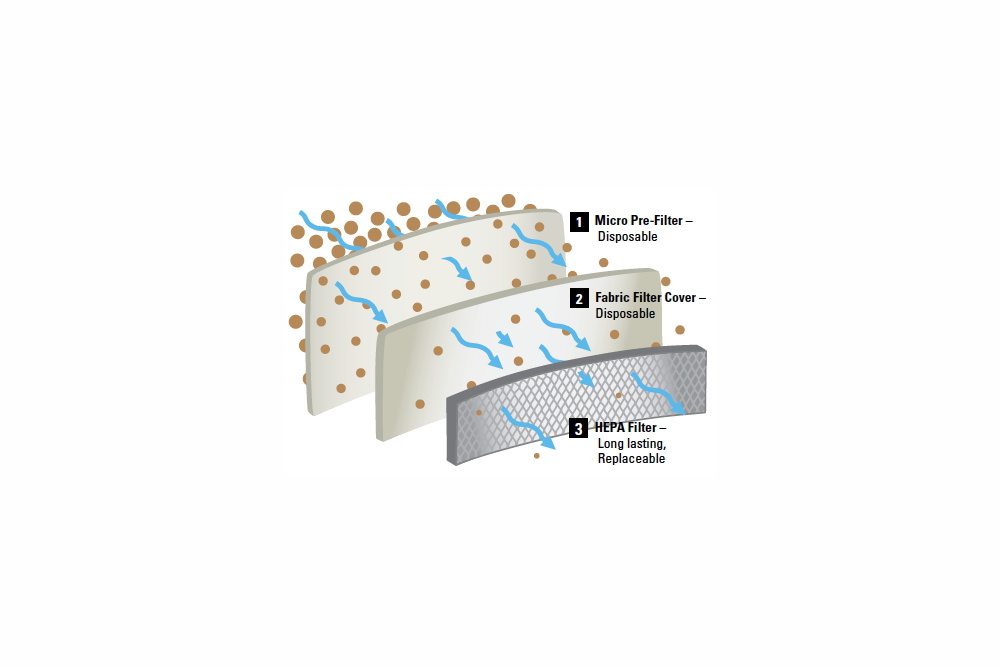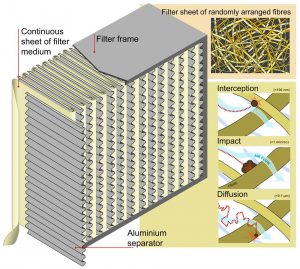Air pollution is a major problem today. Whether within your house or in the external environment, it causes major damage to our respiratory organs. Though we cannot control air pollution in the environment, we can take measures to prevent air pollution within our house and prevent sickness or allergens.
The minute dust particles from the outside environment cannot be seen. Thus, dust particles that cause respiratory problems can be solved using a HEPA Filter, a HEPA air purifier.

What Exactly is A HEPA Filter?
HEPA stands for High-Efficiency Particulate Air. Thus, it is a filter generally included in air-purifying machines or vacuum cleaners to entrap minute dust particles or microorganisms. HEPA air purifiers trap dust particles and prevent them from spreading to other bacteria and viruses that can damage our organs.
True HEPA air purifiers are approximately 99.97% successful in trapping particles as small as 0.3 microns. Thus, they are the most efficient filters in air purifiers, letting us breathe fresh and pure air. They are also considered luxury home goods.
The nuclear industry initially manufactured HEPA air purifiers to capture hazardous radioactive particles. However, HEPA is now used mainly in vacuum cleaners and air purifiers.
Reference: explainthatstuff.com
The Invention of HEPA Filter
The fiber-like filters were first used during the Manhattan Project to trap exceptionally hazardous minute radioactive particles. Slowly and gradually, the HEPA air purifier was developed mainly for industrial use. Later, it is now commonly used in residential apartments and commercial offices to clean large and small dust particles.
How Does HEPA Air Purifier Work?
The basic type of filter works as a strainer with small holes to capture large particles like dust, dirt, and hairs, but the small particles cannot be captured with the help of basic filters.
Thus, the HEPA air purifier was introduced mainly to trap smaller particles in the air. The HEPA filter in vacuum cleaners uses two diverse types of machinery.
First, the outer layer is a basic filter that acts as a strainer to prevent large dust particles. Second, the inner layers materialize like folded material with an opaque glass fiber mat finish.
This layer does not work like a filter; instead, it traps the particles using different techniques. The heavy particles that move slowly and gradually stick to the fiberglass (Diffusion). Lightweight particles travel faster and either collide with fibers (impact) or get fascinated by them while passing (Interception).

This diagram shows the three methods of catching dirt and dust in HEPA filters.
Image source: spotlessvacuum.co.uk
Types of HEPA Filter
An ideal HEPA filter for the best air purifier captures 99.97% of dust particles as minute as 0.3 microns. Only a real HEPA Filter can achieve the objective mentioned above. Thus, you can adjudicate whether your filter is a True HEPA Filter.
HEPA Filters are classified with A to E stickers depending on their efficiency. Type A is considered the least efficient, and Type E is the most efficient and appropriate for defense-grade applications. Vacuum Cleaners generally have Type A filters, which work efficiently within our house.
How Often Does the HEPA Filter Be Replaced in Air Purifiers?
Replacing your HEPA Filter in air purifiers depends on two things: first, if your purifiers include a HEPA filter and a carbon filter, then the carbon filter needs to be replaced within six months and the HEPA Filter once in 24 months.
These replacements also depend on factors like the filter manufacturer, the total surface area of the HEPA Filter, and the environment in which the HEPA Filter functions. Finally, low-quality air purifiers must be replaced annually, and the best-quality ones are suggested after 2-3 years.
Advantages of HEPA Filter
- It captures large and small particles in the air, thus giving fresh and clean air.
- Highly recommended for individuals suffering from asthma and allergies.
- They are available in different sizes and budgets to match your requirements
- It has a higher level of work efficiency. It captures around 99.97% of minute dust.
Disadvantages of HEPA Filter
- HEPA Filters cannot be cleaned or washed to remove dust particles. They must be replaced, which can be quite an expensive task.
- HEPA Filters are tremendously delicate and hence could damage easily while cleaning, installing, or moving the purifier to do the cleaning. Hence, it needs the utmost care while being used.
- Replacing HEPA filters, which are of branded quality, will cost huge amounts of money.
- Some HEPA Filters can even produce ozone or ions, which could be harmful
Things to be Considered Before Buying
- Cross-check that you are buying a genuine HEPA Filter by checking the manufacturer’s guarantee and warranty.
- Always buy the product from a reliable source
- HEPA Filters require regular cleaning and replacement. Thus, calculate the replacement cost in advance to be aware of future expenses.
The Need for HEPA Filter
HEPA Filters are worth buying these days as air pollution levels have increased by an enormous percentage. Though the filters are expensive, they offer a great advantage to individuals suffering from asthma, allergies, or other respiratory problems. The HEPA Filters work efficiently to provide dust-free, clean air. Thus, they provide value for our money.
Reference: https://en.wikipedia.org/wiki/HEPA
Conclusion
Many different kinds of air purifiers are available in the market with different technologies. Some may have HEPA, carbon, ionizing, UV, and other technologies. Some air cleaners also contain more than one technology for advanced functioning and better results. Thus, choose the best one that matches your requirements and budget.
The main function of the HEPA Filter is to remove contaminated viruses from the air and provide clean and pure air. Thus, a HEPA Filter is a crucial purchase element for those suffering from dust or pollen allergies. Strict standards have been set for filters to be classified as HEPA. A HEPA Filter should be able to remove 99.97% of particles as small as 0.3 microns.
So buy only a quality product from reliable sources and avoid buying “HEPA-Type” or “HEPA-Like” filters, as these filters will not provide the best results compared to true HEPA Filters.
Finally, there are many sources from which you can order your HEPA Filter Air Purifier. Why wait any longer to enjoy such luxury home goods? Click here to buy the best HEPA Air Purifier.

what i hard hepa filters are washable also?Is it incorrect